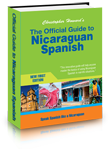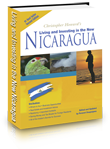Devastated by the wrath of mother nature, its tumultuous political past, and a streak of misfortune, the country is now poised to emerge as a travel hot-spot, a potential haven for expatriates and a place where unlimitied opportunities await the energetic entrpreneur.
In the 1980s most of Central American including Nicaragua was ground zero in the cold war, with the Soviets, Cubans and U.S. orchestrating events behind the scenes. The dictatorship, economic hardship and natural disasters which devastated Nicaragua are disappearing into the past.
At present, Nicaragua can perhaps be most seriously considered the land of opportunity of all the countries in Central America. The country is ripe for investment because it is so underdeveloped. The government, in partiuclar the Nicaraguan Tourism Institute, is bending over backwards to lure investors with the most agessive incentive-filled law in Latin America. They realize the importance of the country’s 300 days of sunshine per year and tourist attractions like the country’s wide, unspoiled Pacific beaches, wildlife, lakes rivers and volcanoes which are virtually untapped. They know what a potential impact tourism can give the country’s economy and have witnessed what the touism boom has meant for neighboring Costa Rica.
As a result of this ambitious effort to boost the tourist trade and other prudent financial polices, foreign investment has jumped from zero to more than 100 million dollars in recent years. A decade of political stability and an improving economic picture have combined to lay the cornerstone for a promising future for the country. Nicaragua has a long way to go, but there appears to be some light at the end of the tunnel with the country on the threshold of an increasing influx of tourists.
Businessmen will be pleased to know the country offers a large under-employed labor pool from which to draw workers. A newly enacted labor code was designed to improve the conditions of workers. The only real drawback is that much of the country’s labor is unskilled and will require training.
Nicaragua has a myriad of business opportunities, perfect for the small and medium-sized entrepreneur looking to start a business on a shoestring. You can run a web-based global business by using the Internet, fax machines and cell phones. At present there are over 10,000 people with Internet accounts in Nicaragua. In general Latin America is a good place to invest. The region has received more foreign investment than any other region in the world — even surpassing Asia. Latin America is also a good place to do business. The opportunities are sizeable and the commercial climate has dramatically improved over the last decade.
With the new millennium upon us, a shrinking world due to better communication, and a burgeoning global economy the possibilities are unlimited for doing business in Central and South America. Trade pacts between Nicaragua, U.S., Mexico and South America will be reality by 2005. They promise to link all of the nations in the hemisphere in to one trading block.
Tax incentives and a government that encourages investments and affords investors virtually the same rights as citizens, contribute to Nicaragua’s propitious business climate. Many countries do not permit noncitizens to own property or place restrictions on foreign-owned real estate, but this is not the case in Nicaragua.
You can even purchase your own “piece of paradise” for a fraction of the cost you might pay in the U.S., Canada or even Costa Rica. One gentleman we know of bought a beachfront lot for a mere $20,000 and spent another $30,000 in constructing his dream home. The same home would have cost three times as much in Costa Rica and probably six to ten times as much in California.
People just scaping by on on a small pension or living below the poverty line in the U.S., will be able to live in moderate luxury and upgrade their lifestyle in Nicaragua. Whether you are a retiree or entrepreneur, you’ll definately get more “bang for your buck” in Nicaragua.
The government has gone to great lenghts to offer retirees a one-time duty-free exemption. Basically, retirees are only required to have a fixed income of at least four hundred dollars monthly from a pension or annuity. In addition, they are allowed to bring $10,000 worth of their household goods and other personal items duty-free and untaxed when they first arive. Another perk is an exemption from income taxes on income generated from abroad.
As an expatriate, you have the challenge of immersing yourself in a new culture and even reap the rewards of learning a foreign language. You’ll be surprised to know that as an expat you’ll make friends easily because foreigners gravitate towards one another.
The country, however, is not for the faint-hearted, but for adventurous souls in search of new horizons and a change of pace. Only these people will reap the rewards of living in a country like Nicaragua. Much like the pioneers who shaped the U.S. in the 19th century, Nicaragua is the “New Frontier.’




